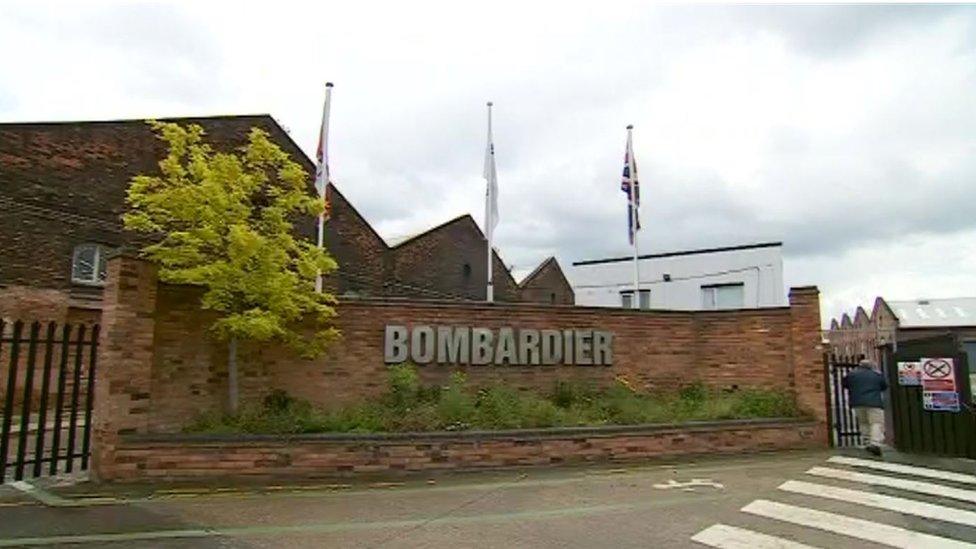Why doesn't the UK take monorails seriously?
- Published
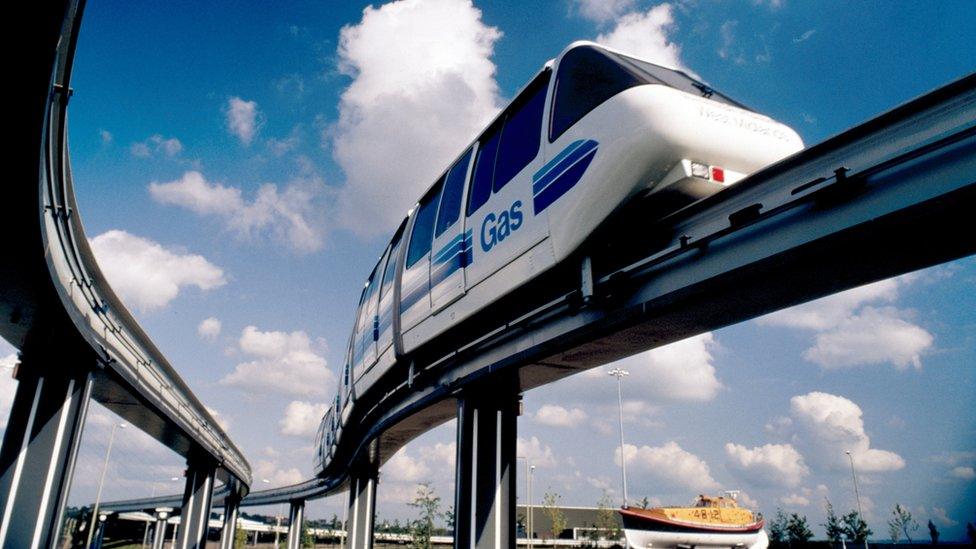
A monorail built for the Merry Hill shopping centre in the West Midlands was beset by problems
When the leader of Derby City Council floated the idea of building a monorail last week, his suggestion was not as warmly received as he might have hoped.
From jokey references to the classic Simpsons episode in which Springfield's new monorail system spun dangerously out of control to descriptions of the proposal as "pie in the sky", few city residents seemed convinced it would ever happen.
Despite potentially solving the twin problems of congestion and pollution, no UK city has yet installed a monorail system. So why are they seemingly not taken seriously?
Allow X content?
This article contains content provided by X. We ask for your permission before anything is loaded, as they may be using cookies and other technologies. You may want to read X’s cookie policy, external and privacy policy, external before accepting. To view this content choose ‘accept and continue’.
Clip: The Simpsons/20th Century Fox Television
What's been proposed in Derby?
Council boss Chris Poulter's grand vision for monorails in Derby was inspired by local manufacturer Bombardier landing a £2.65bn contract to build monorails for Egypt.
"Bombardier are making monorail carriages for the pyramids, so why can't we have something like that in Derby?" he reasoned.
He went on to say the monorail could link the city centre with the Pride Park business park and the planned regional HS2 station in Toton, Nottinghamshire.
What did residents say?
Mixed reviews. On social media the idea was branded "la la land", a "daft idea" and a "fantasy project".
Even those in favour expressed doubt the council could oversee such an ambitious project while others just had fun posting Simpsons gifs.
Laura Pinney, a Derby resident currently on holiday in the US, said she enjoyed riding Seattle's monorail but thought a tram system would be more suitable for Derby.
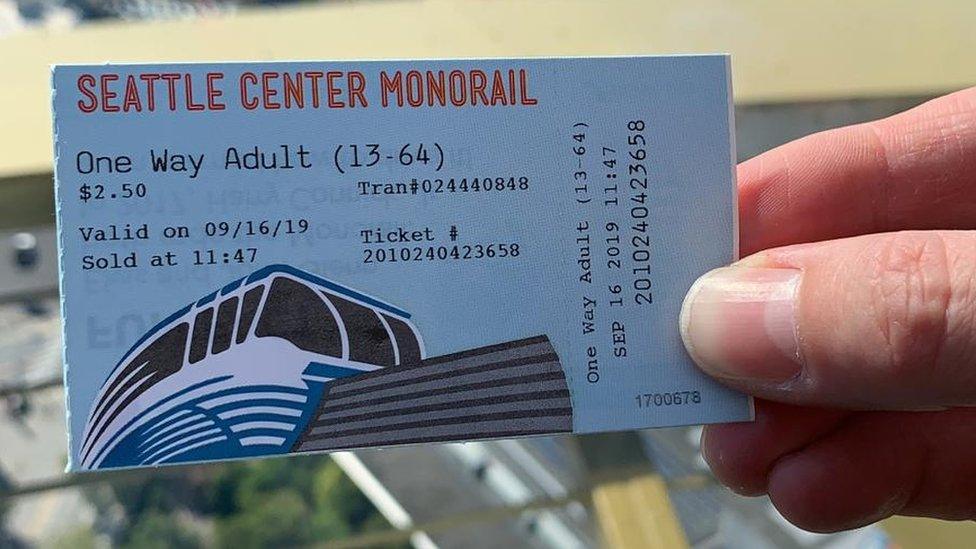
Laura Pinney tried Seattle's monorail on holiday
Are monorails a good idea?
Derby isn't the first UK city to consider the merits of a monorail system but so far no schemes have reached fruition.
Sim Harris, editor of RailNews, said he was not surprised.
"They've never been a tremendous success in the past, by and large," he said.
"Monorails are incredibly intrusive. They get in the way visually much more than railways, tramways and indeed buses. They really dominate the city landscape.
"And I'm not sure of the benefit of using an unusual technology. It'll be harder to maintain, more expensive and won't link to anything else.
"I'd urge them [Derby City Council] to look very closely indeed at the detail, the cost and the consequences.
"Monorails seem like a good idea until you actually use them."
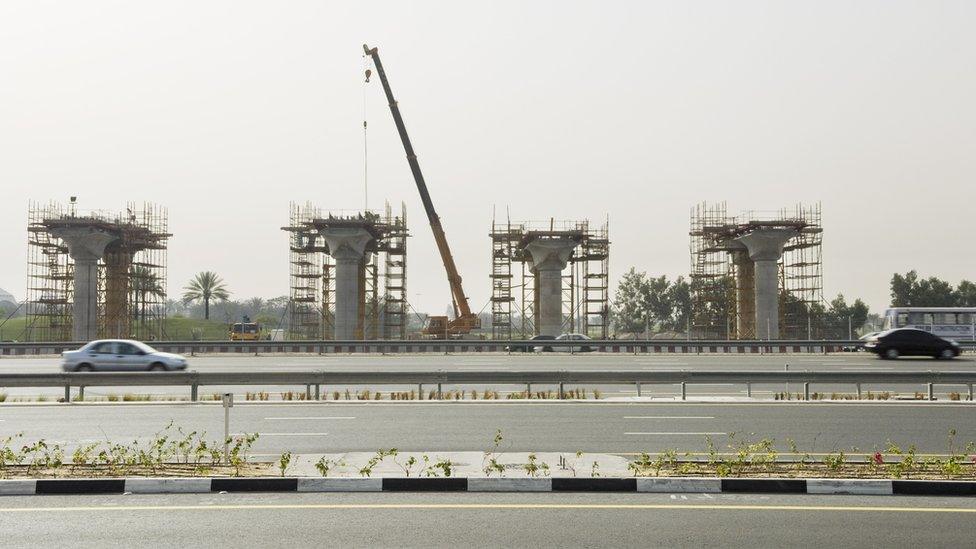
Monorail systems are notoriously costly to build
In his 2019 book, A Short History of Trains, transport writer and broadcaster Christian Wolmar wrote: "[Monorails] have never overcome the basic problems of being expensive to build, and being inflexible due to the structural requirements of their rails."
Bombardier has said the cost of building a monorail system in Derby would run into the billions, quite a stretch for a city council that only spent £74m on capital projects last year and whose most recent major transport project went almost three times over-budget.
So why do other countries have monorails?
While the UK continues to resist the allure of urban monorails, cities in other countries have embraced the concept with varying degrees of success.
China, Japan and India have several monorail networks, with more planned, and they have also been built in Australia, Germany, the US and Malaysia.
Sim Harris said geography and geology played a part.
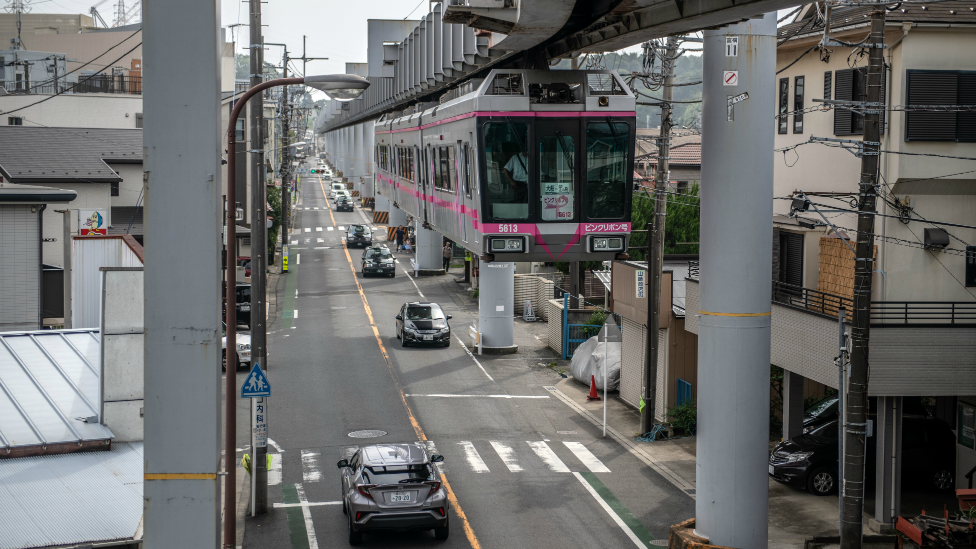
Thousands of people are expected to use Tokyo's monorail system at the Olympics next year
He said: "Many monorail systems run on elevated tracks through crowded areas that would otherwise require the construction of expensive underground lines or have the disadvantages of surface lines.
"China, Japan and India have some of the most crowded cities in the world, and have little space at ground level for conventional trains or trams.
"India, at least, probably cannot afford costly underground lines, and much depends on the geology.
"London is favoured with a stratum of blue clay, particularly north of the Thames, which made construction of a deep tube network easy, comparatively speaking.
"Other cities are not so fortunate, and so building metros under them costs more.
"Also, I suspect that countries like India and China are less bothered about the intrusive aspects of a monorail than we would be in western Europe."
But there are some monorails in the UK?
Yes. Alton Towers in Staffordshire has had one since the 1980s.
However, Chester Zoo's Zoofari monorail - built in 1991 - is being decommissioned as it no longer adequately spans the expanded attraction.
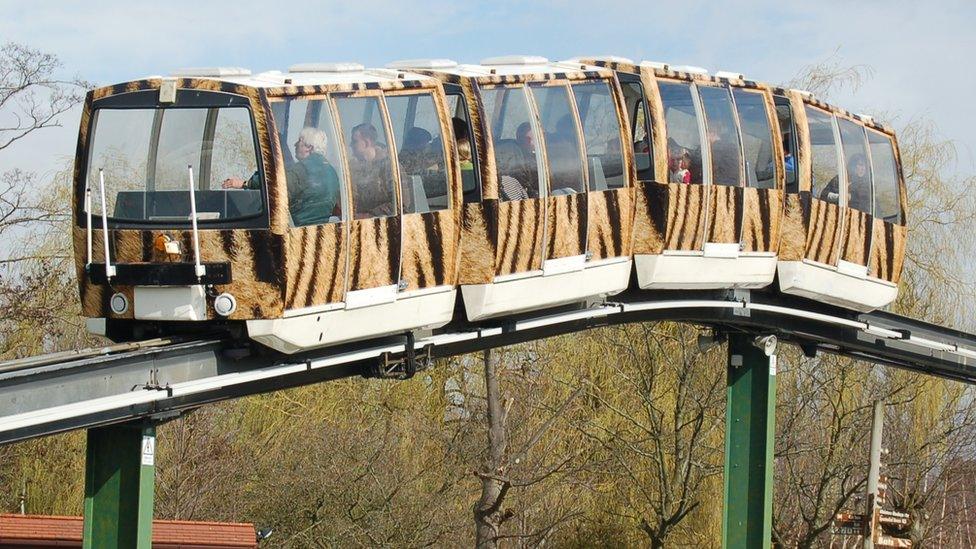
Chester Zoo's Zoofari monorail closed at the start of the month
People in the West Midlands still talk fondly about the monorail built to service the Merry Hill shopping centre near Dudley in 1991.
The £22m system was connected by four stations but closed in 1996 after the centre was sold and the new owners did not want it.
The system was subsequently sold to a shopping centre in Queensland, Australia.
What happened in Sydney?
Perhaps the most high profile monorail failure in recent times was also in Australia - in Sydney.
Opened in July 1988 to link Darling Harbour with the city's central business and shopping districts, the monorail struggled to capture the public's imagination and was closed in June 2013.
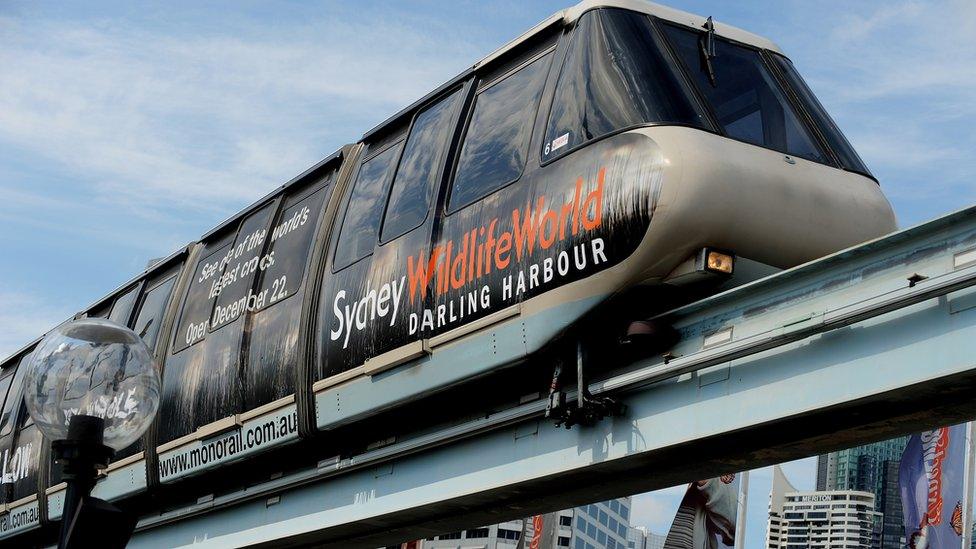
Sydney's monorail was axed after 25 years
Announcing plans to pull the whole thing down, New South Wales premier Barry O'Farrell said: "The monorail is not integrated with Sydney's wider public transport network and has never been truly embraced by the community.
"While it has been a controversial part of Sydney's history for more than 20 years, the monorail is reaching the end of its economic life and the NSW Government cannot justify costly upgrades like the purchase of new vehicles required to keep it running."
You may also be interested in:
Is anyone fighting the corner for monorails?
That would be The Monorail Society. With more than 14,000 members in 104 countries, the group has been espousing the benefits of monorails since 1989.
Aside from the transport's long-touted green credentials, the society says the raised tracks free up the ground beneath for new development, rather than having to build on green spaces.
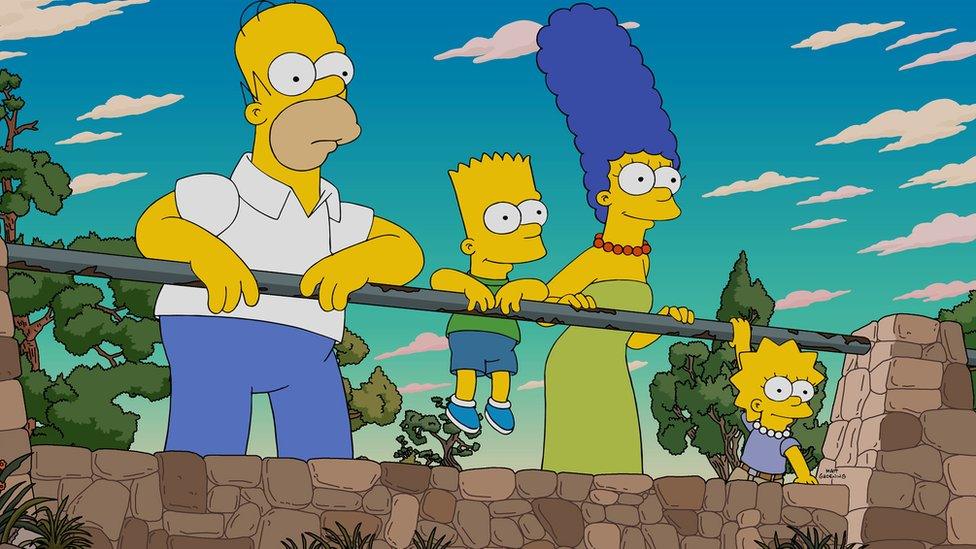
The Monorail Society is less than happy with how monorails were portrayed on The Simpsons
The monorail episode of The Simpson - famous for its catchy musical number - still irritates members of the society.
It said: "In a world where economies lose billions each year due to traffic congestion, which loses millions of acres of wilderness to sprawling development and road construction, we need more green, electric, automated, elevated transportation systems such as monorail, and they need to be represented fairly on television and in the media.
"Have honest, competent engineers build a monorail system for any city and it will be a huge success. The first city to do monorail correctly will be the envy of the world."

Follow BBC East Midlands on Facebook, external, Twitter, external, or Instagram, external. Send your story ideas to eastmidsnews@bbc.co.uk, external.
- Published13 September 2019
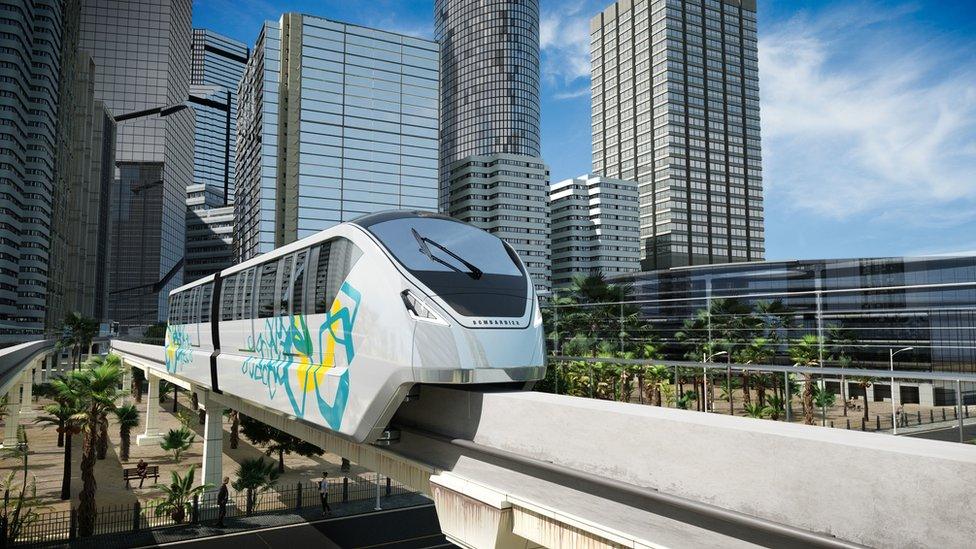
- Published28 May 2019
